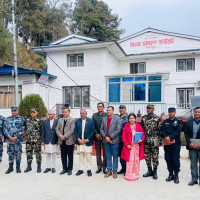- Saturday, 28 February 2026
Data Sharing For Provincial Development
In Nepal, where provinces often share interconnected challenges and opportunities, fostering collaboration is vital for tackling complex issues like infrastructure development, resource management, economic growth, and social welfare. Effective inter-provincial coordination ensures that provinces work collectively rather than in silos, optimising resources, avoiding redundancy, and achieving greater development outcomes. By aligning policies, pooling expertise, and sharing resources, provinces can unlock their full potential, reduce disparities, and address shared challenges more effectively.
One of the fundamental drivers of successful inter-provincial coordination is data sharing. Data empowers policymakers to make informed decisions based on trends, gaps, and opportunities across provinces. The ability to access accurate, real-time, and comprehensive data is essential for planning, monitoring, and evaluating development initiatives. Furthermore, it promotes transparency, builds trust, and fosters healthy competition among provinces. Reliable data exchange can help highlight inequalities, prioritise underserved regions, and strengthen early warning systems for risks such as natural disasters, health crises, or economic downturns. The combination of inter-provincial collaboration and robust data sharing mechanisms forms the backbone of sustainable and inclusive development.
Common challenges
Provinces face numerous common challenges, such as climate change, water resource management, rural-urban migration, and infrastructure gaps. Addressing these issues collectively through inter-provincial cooperation offers several advantages. Coordinated strategies allow provinces to harmonise their policies and development plans, reducing fragmentation and enhancing efficiency. Collaboration also avoids duplication of initiatives, leading to optimised use of financial, human, and technical resources.
The sharing of data is equally critical for strengthening provincial development. Accurate and reliable data enables evidence-based decision-making, helping policymakers identify trends and gaps that require attention. By tracking progress on shared development goals and evaluating the impact of initiatives, provinces can ensure accountability and foster better governance. Furthermore, the exchange of socio-economic and demographic data highlights disparities between provinces, enabling targeted interventions for underserved regions. Data-driven insights also enhance disaster preparedness by providing early warnings and enabling effective risk mitigation.
Several key areas benefit significantly from inter-provincial coordination and data sharing. For instance, infrastructure development requires coordination in planning and implementing large-scale projects such as transportation networks, energy grids, and digital infrastructure. Shared data on land use, population density, and economic activity can help optimise investments and ensure equitable access to infrastructure. Similarly, in economic planning and trade, provinces can align their strategies by sharing information on regional industries, supply chain gaps, and labour markets. This not only promotes balanced development but also maximises inter-provincial trade opportunities.
Environmental management is another crucial area for collaboration. Natural resources like rivers, forests, and energy systems often span across provincial boundaries, making integrated resource management essential. By sharing data on environmental degradation, resource utilisation, and climate risks, provinces can develop joint strategies for sustainable management. Similarly, in the sectors of health and education, data sharing on literacy rates, school enrollments, disease patterns, and healthcare infrastructure can lead to more effective policies and resource allocation.
To facilitate successful inter-provincial collaboration, institutional and technological mechanisms must be established. Formal inter-provincial councils or committees should oversee development strategies, resolve conflicts, and foster regular dialogue through workshops, forums, and joint planning sessions. A centralised data-sharing platform that consolidates key statistics and indicators from all provinces is essential for seamless data exchange. It is also critical to develop policies that mandate data transparency, confidentiality safeguards, and cooperation between provinces. Unified frameworks for data collection, validation, and sharing can help overcome inconsistencies and ensure reliability.
Capacity-building initiatives play a crucial role in enhancing inter-provincial coordination and data sharing. Provinces must strengthen their technical capacities to collect, analyse, and utilise data effectively. Knowledge-sharing programmes can help build skills and promote collaboration across regions. Leveraging advanced technologies such as Geographic Information Systems (GIS), Artificial Intelligence (AI), and data analytics can further support evidence-based decision-making.
Despite its numerous benefits, inter-provincial coordination and data sharing face several challenges. Data gaps and inconsistencies, lack of trust and collaboration, limited technological infrastructure, and bureaucratic barriers often hinder effective coordination. Provinces may lack standardised data collection methods, resulting in incomplete or unreliable data. To address this, unified frameworks for data collection and reporting must be developed. Establishing protocols for data protection and transparent communication can help build trust among provinces. Investments in digital infrastructure and capacity-building are necessary to overcome technological limitations, while streamlined governance mechanisms with clear roles and responsibilities can address institutional barriers.
The Lumbini Manifesto, unveiled by the Vice-Chairpersons of Policy and Planning Commissions from Nepal's seven provinces last year, provides a roadmap for strengthening inter-provincial coordination and data sharing. The Lumbini declarations outlines commitments to long-term planning, resource optimisation, importance of institutional strengthening, capacity building, monitoring and evaluation, and the establishment of robust data-sharing mechanisms.
Collective commitment
It adopted a 15-point Lumbini Declaration, demonstrating a collective commitment to strengthening federalism and fostering coordination in development management. Key lessons and successful practices from the first term of federalism have been documented, providing valuable insights for the preparation of the Second Periodic Plan (2081–2085). In conclusion, inter-provincial coordination and data sharing are indispensable for strengthening provincial development in Nepal.
By fostering collaboration, aligning policies, and sharing data-driven insights, provinces can collectively overcome shared challenges, reduce disparities, and unlock their full development potential. Establishing robust mechanisms for coordination and ensuring reliable, transparent data exchange will pave the way for sustainable and inclusive growth, benefiting all regions and communities. Nepal continues its journey toward federalism, inter-provincial cooperation and data sharing will remain central to achieving its vision of equitable and strengthening federalism.
(The author is a former vice-chairman of Provincial Planning Commission of Lumbini.)

















